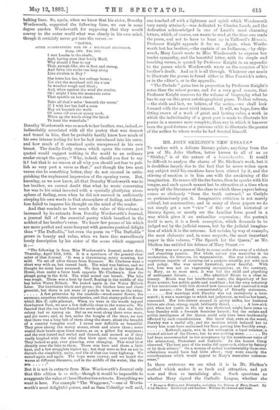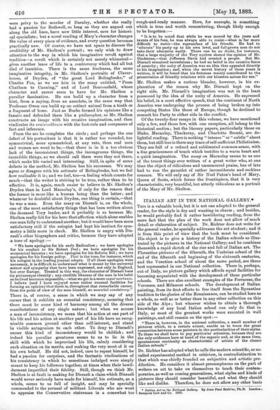MR. JOHN SKELTON'S NEW ESSAYS.*
To readers with a delicate literary palate, anything from the pen of Mr. John Skelton, better known to all of us as " Shirley," is of the nature of a Lonne-bouche. It would be difficult to analyse the charm of Mr. Skelton's work, but it is doubtless largely due to the fact that he never writes upon any subject until his emotions have been stirred by it, and the stirring of emotion is in him one with the awakening of the
He muses till the fire burns, then he speaks with his tongue, and such speech cannot but be attractive at a time when nearly all the literature of the class to which these papers belong comes so obviously "from the teeth outward," as Carlyle- so pertinaciously put it. Imaginative criticism is not merely critical, but constructive ; and in many of these papers we do not simply get a new " view " of this or that historical or literary figure, or merely see the familiar form posed in a way which gives it an unfamiliar expression ; the portrait itself is new, it is a fresh conception, which demands to be judged not by the judicial reason, but by the judicial imagina- tion of which it is the outcome. Let us take, by way of example, the most elaborate and, in some respects, the most important paper in this volume, "The Speech for the Queen," as Mr.. Skelton has entitled his defence of Mary Stuart :—
"Mary was not a person likely to come under the sway of a violent and absorbing passion. Her whole nature was masculine in it moderation, its firmness, its magnanimity. She was tolerant, =- capricious, capable of carrying out a purpose steadily, yet with tact and policy. She was never hysterical, never fanciful. With her, love was not an engrossing occupation; on the contrary, to Mary, as to most men, it was but the child and plaything- of unfrequent leisure She admitted Rizzio to a close in- timacy. Rizzio was her intellectual mate, the depository of her- State secrets, her politic guide and confidant ; hut the very notoriety of her intercourse with him showed how innocent and unaextml it was in its nature,—the frank companionship of friendly statesmen.
Her marriage with Darnley was not exclusively a love- match ; it was a marriage to which her judgment, as well as her heart, consented. Her love-letters abound in pretty trifles, her business letters are clear, strong, rapid, brilliantly direct A love-sick girl, When her castle in the air was shattered, might have come to. hate Darnley with a feverish feminine hatred ; but the sedate and politic intelligence of the Queen could only have been incidentally- affected by such considerations. She knew that, even at the worst, Darnley was a useful ally, and the motives which induced her to, marry him must have restrained her from putting him forcibly away.
Bothwell, again, was in her .estimation a loyal retainer, a trusted adviser of the Crown, but he was nothing more He
had been recommended to her acceptance by the unanimous voice of the aristocracy, Protestant and Catholic. As the honest Craig observed, The best part of the realm did approve it either by flattery or by their silence.' On a woman of ardent sentimentality these con- siderations would have had little effect ; they were exactly the considerations which would appeal to Mary's masculine common- sense."
In these sentences we see what it is in Mr. Skelton's method which makes it so fresh and attractive, and yet now and then so tantalising also. Such questions as whether Mary signed the Catholic League, whether she
• Sways in History and Biography. including the Defence of Mary Stuart. By John Skelton. Ediubargh and London : William Blmkwood and BORE.
were privy to the murder of Darnley, whether she really had a passion for Bothwell, so long as they are argued out along the old lines, have now little interest, save for histori-
cal specialists; but a novel reading of Mary's character changes the value of every piece of evidence, and every question becomes practically new. Of course, we have not space to discuss the credibility of Mr. Skelton's portrait; we only wish to draw attention to the way in which his imaginative revolt against tradition—a revolt which is certainly not merely whimsical— gives another lease of life to a controversy which had all but died of inanition. There is the same freshness, the same
imaginative integrity, in Mr. Skelton's portraits of Claver- house, of Dryden, of "the great Lord Bolingbroke," of Charles Fox, as we see him in the essay entitled, "From Chatham to Canning," and of Lord Beaconsfield, whose character and career seem to have for Mr. Skelton a peculiar fascination. He can build up a character from a hint, from a saying, from an anecdote, in the same way that Professor Owen can build up an extinct animal from a tooth or a fragment of bone. Just as Burke formed his opinions like a
fanatic and defended them like a philosopher, so Mr. Skelton constructs an image with his creative imagination, and then vindicates its vraisemblan:e with the foot-rule and compasses of fact and inference.
From the arc he completes the circle ; and perhaps the one defecf of his portraiture is that it is rather too rounded, too symmetrical, more symmetrical, at any rate, than real men and women are wont to be,—that there is in it a too obvious lack of the inconsistent things, the incongruous things, the incredible things, as we should call them were they not there, which make life varied and interesting. Still, in spite of some defects in the method, Mr. Skelton has his successes. We may agree or disagree with, his estimate of Bolingbroke, but we feel how realisable it is; and we feel, too—a feeling which counts for much—that the writer is striving to be true, rather than to be -effective. It is, again, much easier to believe in Mr. Skelton's Dryden than in Lord Macaulay's, if only for the reason that the former is more like a human being than the latter; and whatever be doubtful about Dryden, one thing is certain,—that he was a man. Even the essay on Disraeli is, on the whole, -one of the most satisfactory things that has been written about the deceased Tory leader, and it probably is so because Mr. Skelton really felt for his hero that affection which alone enables -one man fully to understand another; but it would have been more satisfactory still if the eulogist had kept his instinct for sym- metry a little more in check. Mr. Skelton is angry with Dis- raeli's other biographers and critics, because they have adopted -a tone of apology :—
"We have apologies for his early Radicalism ; we have apologies for his conduct to Sir Robert Peel ; we have apologies for his economical heresies ; we have apologies for his Reform Bill ; we have -apologies for his foreign policy. That is the tone, for instance, which his eulogist in the leading journal adopts. If all these apologies were necessary, it is difficult to understand what is meant by the universal sorrow and sympathy that have been expressed, not only in England, but over Europe. Treated in this way, the character of Disraeli loses fits picturesque identity ; any credible likeness of the man in his habit as he lived becomes impossible,—what we get is a mere caputinortuum. I believe (and I have enjoyed some rather unusual facilities for forming an opinion) that-there is, throughout that remarkable career, from the point of view of the man himself, an essential consistency."
There is, of course, a sense in which we may say of any
career that it exhibits an essential consistency, meaning that there must be some kind of harmony among all the diverse -manifestations of any single nature ; but when we accuse
a man of inconsistency, we mean that his action at one part of his life and his action at another part of his life have no recog- nisable common ground other than self-interest, and stand in visible antagonism to each other. To deny to Disraeli's career this kind of inconsistency would be childish ; and indeed his peculiar greatness seems to us to lie in the skill with which he improvised his life, calmly considering
each situation on its merits, and making the very most of it on his own behalf. He did not, indeed, care to repeat himself, he had a passion for surprises, and the fantastic vindications of his consistency in which be sometimes indulged were simply
meant to keep his followers together, at times when their bewil- derment imperilled their fidelity. Still, though we think Mr. Skelton is at fault in making for Disraeli a claim which Disraeli would never seriously have made for himself, his estimate, as a whole, seems to us full of insight, and may be specially commended to the perusal of militant Liberals who are wont to appraise the Conservative statesman in a somewhat too
rough-and-ready manner. Here, for example, is something which is true and worth remembering, though likely enough to be forgotten :— " It is to be noted that while he was moved by the jeers and taunts of his foes, he was always able to resist—what is far more difficult to resist—the reproaches of his friends. He had to 'educate' his party up to his own level, and full-grown men do not take their education easily. There can be no doubt, for instance, that a large majority of the Tory squires shared the opinion of Mr. Gladstone,—that Jefferson Davis had created a people. But Mr. Disraeli remained incredulous ; he had no belief in the creative force of anarchy ; the unity of America was an idea that appealed directly to his imagination ; and, when the secret history of these years is written, it will be found that his firmness mainly contributed to the preservation of friendly relations with our kinsmen across the sea."
Mr. Skelton makes a curious blander, however, in his ex- planation of the reason why Mr. Disraeli kept on the right side. Mr. Disraeli's imagination was not in the least possessed by the idea of the unity of America. He expressed his belief, in a most effective speech, that the continent of North America was undergoing the process of being broken up into competing States like those of Europe, though he declined to commit his Party to either side in the conflict.
Of the twenty-four essays in this volume, we have mentioned only a few, and those few, with one exception, all belong to the historical section ; but the literary papers, particularly those on Blake, Macaulay, Thackeray, and Charlotte Brontë, are de- lightful reading. There is nothing "intense " or" subtle" about them, but still less is there any trace of self-sufficient Philistinism. They are full of a refined and sublimated common-sense, with a fine graciousness of touch which testifies to a warm heart and a quick imagination. The essay on Macaulay seems to us one of the truest things ever written of a great writer who, at one time the object of ridiculous and unmeasured praise, has of late had to run the gauntlet of rather inconsiderate and reckless censure. We will only say of Sir Noel Paton's head of Mary, Queen of Scots, which forms the frontispiece, that it is very characteristic, very beautiful, but utterly ridiculous as a portrait of the Mary of Mr. Skelton.



































 Previous page
Previous page